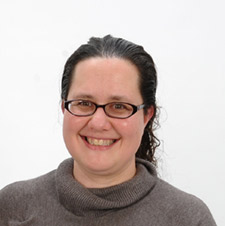About
Julia Sienkewicz

Julia Sienkewicz
Statement
The College Art Association stands at a cross-roads in which declining conference attendance, economic pressures, and a shift in hiring practices are straining its endurance and challenging its historical role as the premiere professional organization for the arts worldwide. As the author of the CAA’s Annual Conference history in the The Eye, the Hand, the Mind (Chapter 6), I have developed a long view of the value of the organization’s contributions over its history. No matter the present challenges, I believe our efforts to strengthen CAA’s foundations and reshape it in new, productive directions will be rewarded. I believe in the value of CAA’s past and its future potential. This commitment led me to professional service to the CAA during graduate school and to volunteer continuously for the organization through the last eight years.
I have three central concerns I would take on in the role as a CAA Board member: advocacy for and engagement with early career members; working to ensure that the CAA supports the growth of greater equality and diversity in arts professions; and bringing together our constituencies around our shared work of teaching, whether in classrooms, museums, or elsewhere. Early career professionals are the future of the organization, yet current economic pressures have reduced their presence, voice, and realistic career paths. Though many individuals first attend the conference at a job interview, new interviewing practices are rapidly changing this tradition. I would encourage outreach initiatives to create virtual communities and would work to consider other ways by the organization could grow the enthusiasm and commitment of its newest members. Connected to these concerns, but not limited to them, are issues surrounding equity and plurality in the arts professions. Pursuing greater diversity and equity requires recruiting and mentoring students from the undergraduate level forward—and I would support efforts for such work via the CAA. However, diverse faculty of all categories require long-term support in order to overcome the particular strains that often derail careers and reduce career satisfaction. As a pre-tenure female faculty member and mother of a young child, I have personal experience with many roadblocks and an extra concern with ensuring that we do all we can to support CAA’s most vulnerable constituents. The CAA formed as an organization whose members were all teachers in arts professions. Pedagogy and the scholarship of teaching and learning, thus, have a long history in the organization, though they have been sidelined by the greater prestige of research. While I share this passion for research, I believe that an intentional approach to supporting our members as educators—within the academy and beyond—may both strengthen the standing of our professions within society and our bond as arts professionals.
Finally, the concerns of Board members go beyond the organization’s internal challenges. We are in a historical moment when the value of the arts and humanities is being called into question. I would support projects to generate evidence-based arguments for the value of teaching and learning the arts.


